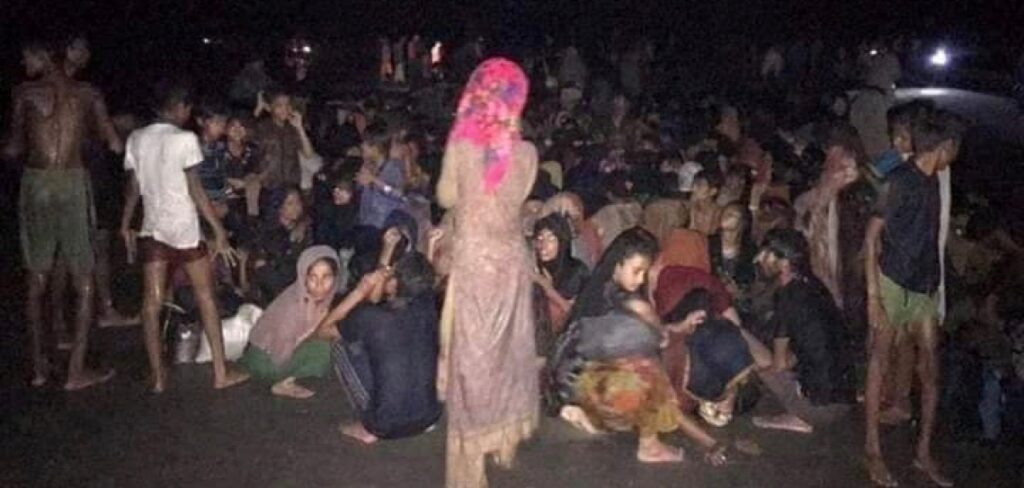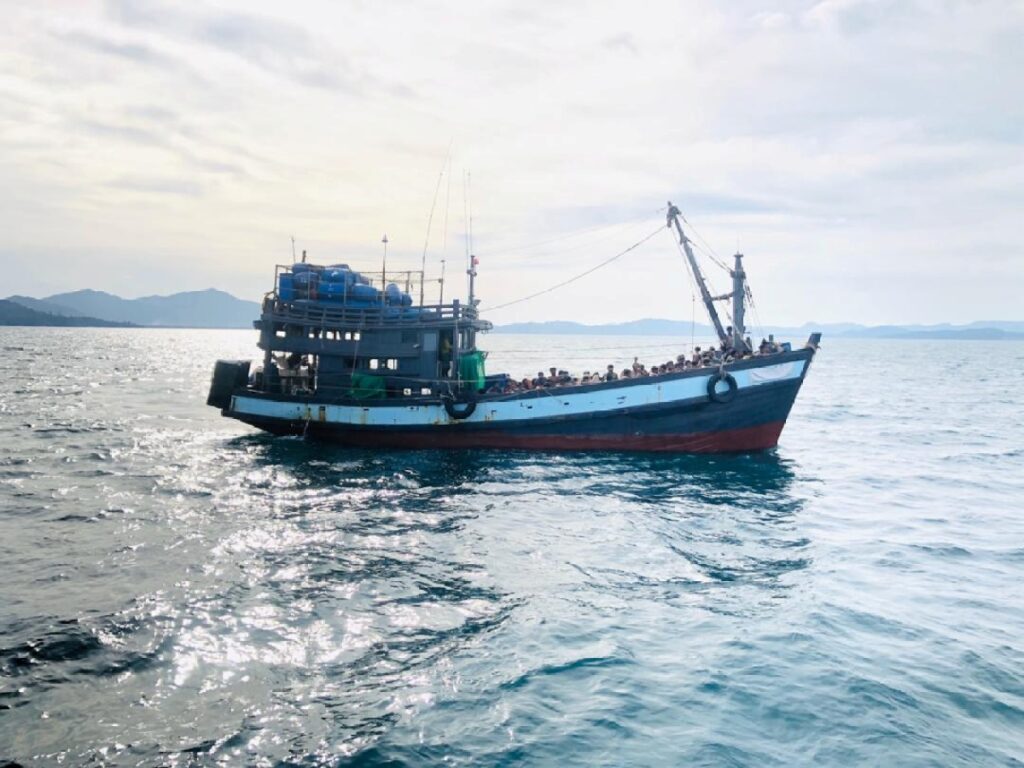Rohingyas at Sea for 2 Months, 32 Die
ASIA-UPDATES ON MYANMAR ROHINGYA GENOCIDE, 20 Apr 2020
Abdul Kuddus and Gias Uddin | Prothom Alo - TRANSCEND Media Service
In 2018 trafficking gradually began again in the region, but presently due to coronavirus, no country is willing to take in the Rohingyas.
17 Apr 2020 – Amid the coronavirus scare, 396 Rohingyas were rescued from the Teknaf coast on Wednesday and have been kept in quarantine. The UN refugee agency UNHCR has taken responsibility for the quarantine, health tests and safety of the rescued Rohingyas.
Additional superintendent (administration) of Cox’s Bazar police, Mohammad Iqbal Hossain, informed Prothom Alo that the survivors had said that 32 of the Rohingyas had died of hunger while at sea. Around two months ago, 482 Rohingyas had set off for Malaysia, lured by human traffickers with promises of a ‘better life and marriage’. However, the Malaysian navy did not allow them to alight there and so they turned back to return to Teknaf. The rescued Rohingyas are all from camps in Ukhia and Teknaf.
The rescued Rohingyas said they came back to Bangladesh after being turned away first by the Malaysian navy, then by the Thai navy and then also by the Myanmar navy.
The human trafficking issue came to international attention in 2015 after mass graves were discovered in n a jungle in Thailand. For two years after that, this trafficking had almost come to halt. In 2018 trafficking gradually began again in the region, but presently due to coronavirus, no country is willing to take in the Rohingyas. The rescued Rohingyas said they came back to Bangladesh after being turned away first by the Malaysian navy, then by the Thai navy and then also by the Myanmar navy.
Deputy commissioner Md Kamal Hossain told Cox’s Bazar that it had first been decided to ‘push back’ the Rohingyas into Myanmar, but considering the circumstances, it was decided to hand them over to UNCHR supervision.
The police have said that 200 of them have been kept at the refugee repatriation centre at the transit site of Kerantali, Teknaf. The remaining 196 have been kept at an ‘isolation unit’ in the Kutupalong TV broadcast centre in Kutupalong, Ukhia. Of the 396 rescued Rohingyas, 182 are women, 150 are men and 64 are women.
The trawler carrying the Rohingyas arrived at the Jahagpura coast of Baharchhara union, Teknaf at 10:30 Wednesday night. The coast guard arrived on the spot and detained them.
Death on the trawler
Speaking to rescued Rohingya Liakat Ali (22) at the Teknaf jetty on Thursday morning, it was learnt that he was from the Thayongkhali camp in Ukhia. He had set off for Malaysia by trawler in the hope of a job in Malaysia. He lamented that his younger brother Mohammed Nasim had died on the trawler, after four days without food. His brother’s body had to be disposed of in the sea, without the religious ‘janaza’ rites.
Jan- e-Alam’s 4-year-old daughter died of hunger in the trawler. Jan-e-Alam grieves that his beloved daughter was left behind in the sea.
The rescued Rohingyas said that there had been seven or eight agents of the human traffickers on board with them. The Rohingya men were promised jobs in Malaysia and the girls were promised marriage.
From 1 March last year till Thursday, the law enforcement agencies rescued 1,551 Rohingya men, women and children from Chattogram, Cox’s Bazar, Maheshkhali, Ukhia, Ramu, Teknaf and St Martin’s, while they were attempting to go to Malaysia. Two-thirds of them were women.
When the trawler finally reached the Malaysian coast after seven days, they were obstructed by the authorities there. They were told that no Rohingyas would be allowed into Malaysia then because of the coronavirus outbreak. They handed over sacks of rice and vegetables to them and sent them back to sea. For the past 50 days these Rohingyas have been floating in the Bay of Bengal. They failed several times to reach the Teknaf shore due to BGB and Coast Guard vigilance.
Promises of marriage
According to the police, over 100 of the rescued women were young. Two of these girls, Khurshida Begum and Amina Khatun, said they had been two and a half years in the camp but were not getting married. The young men in the camp didn’t have much work and were mostly idle. That is why these girls took the risk to travel by trawler in the hope of changing their lives. The agents had promised them good prospective grooms in Malaysia.
The Rohingya said that the agents took around 20,000 to 50,000 taka from each of them and picked them up from the Teknaf coast. They were each supposed to pay another 100,000 taka to 150,000 taka to the agents once they reached Malaysia.
1,551 Rohingyas rescued till date
The Coast Guard’s Teknaf station commander M Sohel Rana said that there was an increased the incidence of Rohingyas falling prey to the traffickers and attempting to flee from the camps to go to Malaysia. On 12 February a trawler carrying 138 Rohingyas sunk at sea near St Martin’s. A total of 19 drowned and died. The Coast Guard managed to rescue 73 alive, but 46 remained missing.
From 1 March last year till Thursday, the law enforcement agencies rescued 1,551 Rohingya men, women and children from Chattogram, Cox’s Bazar, Maheshkhali, Ukhia, Ramu, Teknaf and St Martin’s, while they were attempting to go to Malaysia. Two-thirds of them were women. A total of 54 agents involved in the trafficking were arrested and sent to jail. And seven suspected traffickers were killed in ‘gunfights’ with the law enforcement. Three of them were Rohingya and six were Bangladeshis. There is generally a surge in human trafficking by sea route from September to April.
___________________________________________
This report appeared in the print edition of Prothom Alo and has been rewritten in English by Ayesha Kabir.
Tags: Asia, Aung San Suu Kyi, Bangladesh, Buddhism, Burma/Myanmar, Cultural violence, Direct violence, Ethnic Cleansing, Free Rohingya Coalition, Genocide, History, Human Rights, International Court of Justice ICJ, Justice, Maung Zarni, Racism, Religion, Rohingya, Social justice, Structural violence, United Nations
DISCLAIMER: The statements, views and opinions expressed in pieces republished here are solely those of the authors and do not necessarily represent those of TMS. In accordance with title 17 U.S.C. section 107, this material is distributed without profit to those who have expressed a prior interest in receiving the included information for research and educational purposes. TMS has no affiliation whatsoever with the originator of this article nor is TMS endorsed or sponsored by the originator. “GO TO ORIGINAL” links are provided as a convenience to our readers and allow for verification of authenticity. However, as originating pages are often updated by their originating host sites, the versions posted may not match the versions our readers view when clicking the “GO TO ORIGINAL” links. This site contains copyrighted material the use of which has not always been specifically authorized by the copyright owner. We are making such material available in our efforts to advance understanding of environmental, political, human rights, economic, democracy, scientific, and social justice issues, etc. We believe this constitutes a ‘fair use’ of any such copyrighted material as provided for in section 107 of the US Copyright Law. In accordance with Title 17 U.S.C. Section 107, the material on this site is distributed without profit to those who have expressed a prior interest in receiving the included information for research and educational purposes. For more information go to: http://www.law.cornell.edu/uscode/17/107.shtml. If you wish to use copyrighted material from this site for purposes of your own that go beyond ‘fair use’, you must obtain permission from the copyright owner.
Read more
Click here to go to the current weekly digest or pick another article:
ASIA-UPDATES ON MYANMAR ROHINGYA GENOCIDE:

